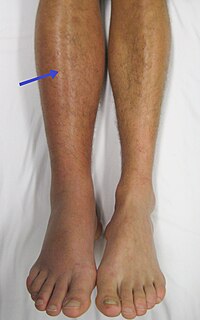
Photo from wikipedia
BackgroundD-dimer levels have been used in the diagnosis of a variety of thrombosis-related diseases. In this study, we evaluated whether measuring D-dimer levels can help to diagnose cerebral infarction (CI)… Click to show full abstract
BackgroundD-dimer levels have been used in the diagnosis of a variety of thrombosis-related diseases. In this study, we evaluated whether measuring D-dimer levels can help to diagnose cerebral infarction (CI) in critically ill cancer patients.MethodsWe retrospectively evaluated all cancer patients who underwent brain magnetic resonance imaging (MRI) between March 2010 and February 2014 at the medical oncology intensive care unit (ICU) of Samsung Medical Center. Brain MRI scanning was performed when CI was suspected due to acute neurological deficits. We compared D-dimer levels between patients ultimately diagnosed as having or not having CI and analyzed diffusion-weighted imaging (DWI) lesion patterns.ResultsA total of 88 patients underwent brain MRI scanning due to clinical suspicion of CI; altered mental status and unilateral hemiparesis were the most common neurological deficits. CI was ultimately diagnosed in 43 (49%) patients. According to the DWI patterns, multiple arterial infarctions (40%) were more common than single arterial infarctions (9%). Cryptogenic stroke etiologies were more common (63%) than determined etiologies. There was no significant difference in D-dimer levels between patients with and without CI (P = 0.319). Although D-dimer levels were not helpful in diagnosing CI, D-dimer levels were associated with cryptogenic etiologies in critically ill cancer patients; D-dimer levels were higher in the cryptogenic etiology group than in the determined etiology group or the non-infarction group (P = 0.001). In multivariate analysis, elevated D-dimer levels (> 8.89 μg/mL) were only associated with cryptogenic stroke (adjusted OR 5.46; 95% confidence interval, 1.876–15.857).ConclusionsAbnormal D-dimer levels may support the diagnosis of cryptogenic stroke in critically ill cancer patients.
Journal Title: BMC Cancer
Year Published: 2017
Link to full text (if available)
Share on Social Media: Sign Up to like & get
recommendations!